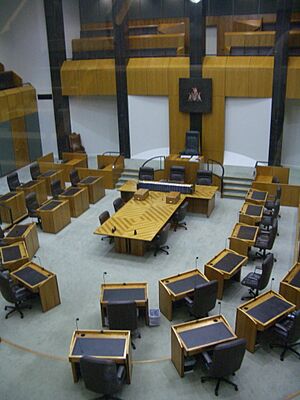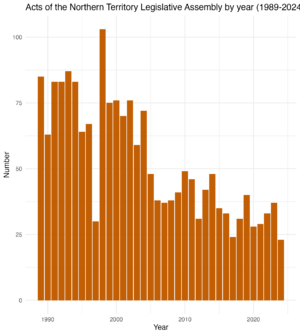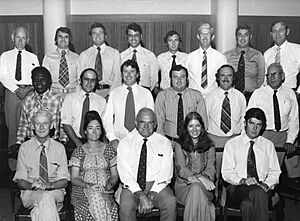Northern Territory Legislative Assembly facts for kids
Quick facts for kids Legislative Assembly |
|
|---|---|
| 15th Assembly | |
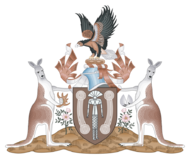
Coat of Arms of the Northern Territory
|
|

Legislative Assembly logo
|
|
| Type | |
| Type | |
| History | |
| Founded | 1974 |
| Leadership | |
|
Speaker
|
Robyn Lambley
Since 15 October 2024 |
|
Deputy Speaker
|
TBD
|
|
Leader of Government Business
|
Steve Edgington, Country Liberal
|
|
Government Whip
|
Andrew Mackay, Country Liberal
Since 24 August 2024 |
| Structure | |
| Seats | 25 |
|
Political groups
|
Government (17)
Opposition (4)
Crossbench (4)
|
|
Length of term
|
4 years |
| Elections | |
| Full preferential voting | |
|
Last election
|
24 August 2024 |
|
Next election
|
22 August 2028 |
| Meeting place | |
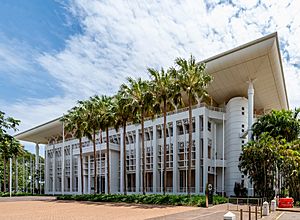 |
|
| Parliament House, Darwin | |
The Legislative Assembly of the Northern Territory is like the main law-making group for Australia's Northern Territory. It's also known as the Parliament of the Northern Territory. This Assembly has 25 members, and each one is chosen by voters in a specific area. These members serve for four years.
People vote using a system called full preferential voting. This means you rank your choices for who you want to represent you. Elections happen every four years, usually on the fourth Saturday in August. However, an election can happen sooner if the government loses the support of most members. The last election was on 24 August 2024. The next one is planned for 22 August 2028.
Anyone over 18 who can vote in federal elections for the Northern Territory can also vote for the Legislative Assembly. Voting is a must for all eligible adults. Since 2004, the Northern Territory Electoral Commission has managed these elections. They also make sure voting areas are fair and up-to-date.
When the Legislative Assembly passes a new rule, it's called a bill. For a bill to become a law, the Administrator of the Northern Territory must approve it. The Administrator represents the Australian Government and the King in the Northern Territory.
Contents
Understanding the Legislative Assembly
The Legislative Assembly is a "unicameral" body. This means it has only one main group of lawmakers. Many other places have two groups, but the Northern Territory has just one.
How Members Are Chosen
Each of the 25 members is elected from a "single-member electorate." This means that for each specific area, voters choose one person to represent them. The person with the most votes in that area wins the seat.
Who Makes Up the Assembly Now?
As of 5 September 2024, here's how the 25 seats in the Assembly are divided:
| Party | Seats | ||
|---|---|---|---|
| Current Assembly (Total 25 Seats) | |||
| Country Liberal | 17 |
|
|
| Labor | 4 |
|
|
| Independent | 3 |
|
|
| Greens |
1 |
|
|
To pass new laws, at least 13 votes are needed. This is called a majority.
What the Assembly Does
In 1978, the Northern Territory gained "self-government." This means it could make many of its own laws. Before this, the federal government in Canberra made most of the rules. The federal government still controls some areas. These include Aboriginal land, rules about jobs, national parks, and uranium mining.
Making Laws for the Territory
When members of the Assembly vote on a topic, the side with the most votes wins. The Speaker, who leads the meetings, also gets to vote. If there's a tie, the Speaker gets an extra vote to break it.
How Laws Are Approved
After the Assembly passes a bill, it needs approval from the Administrator. This is usually a formal step. It's like getting a final stamp of approval. The Governor-General of Australia can also reject a law, but this happens very rarely. The federal government can also make laws for the Territory. They can even change laws the Assembly has passed. For example, the federal Parliament once changed a law passed by the Territory's Assembly because they had different ideas about it.
The Role of the Chief Minister
The political party or group with the most seats in the Assembly forms the government. The Administrator asks the leader of this group to become the Chief Minister of the Northern Territory. Other senior members of the party become ministers. They are in charge of different areas, like education or health. Since members usually vote with their party, most laws proposed by the government usually pass.
A Look Back: History of the Assembly
When the Northern Territory became part of the Commonwealth in 1911, the federal government managed it directly. Over time, there were different councils that helped make decisions. In 1947, the Northern Territory Legislative Council was formed. It had both elected and appointed members.
Early Days and Self-Government
The current Legislative Assembly started in 1974. It was created by a law from the Australian federal parliament. Unlike earlier councils, all its members were elected by the people. At first, it didn't have much power. But in 1978, it gained "limited self-government." This meant it could make more important decisions for the Territory. In 1983, the number of members in the Assembly grew from 19 to 25.
Changes in Leadership Over Time
From its start in 1974 until 2001, the Country Liberal Party usually held power. In 2001, the Labor Party won a small majority. Clare Martin became the first Labor Chief Minister and the first woman to hold the role. Labor continued to govern for several years.
Sometimes, members changed parties or became independent. This could change which party had the most power. In 2012, the Country Liberal Party returned to power. However, some members later left the party. This meant the government had fewer members supporting it.
The 2016 election saw a big change. The Labor Party won by a large amount, and Michael Gunner became Chief Minister. The Speaker, who runs the Assembly meetings, was Kezia Purick for many years. She later resigned, and new Speakers were chosen, including Chansey Paech and then Ngaree Ah Kit.
See also
- 2024 Northern Territory general election
- Parliaments of the Australian states and territories
- Members of the Northern Territory Legislative Assembly
- Northern Territory ministries
- List of museums in the Northern Territory
- List of Northern Territory by-elections
 | John T. Biggers |
 | Thomas Blackshear |
 | Mark Bradford |
 | Beverly Buchanan |


